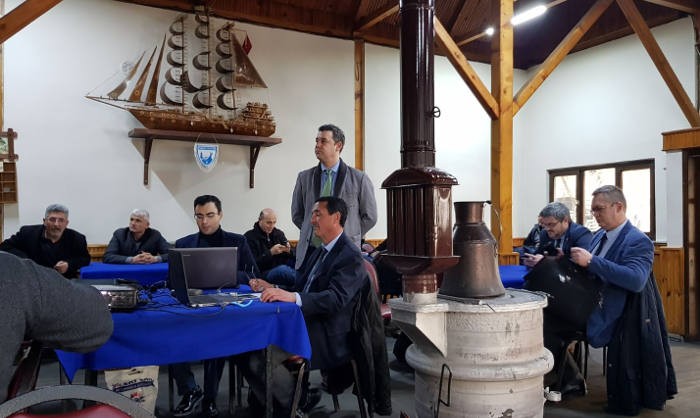-
19 April 2018
Category : Interview
FIIAPP Expatriates: Carlos Ossorio
“The Turkish people are very hospitable, fun and easy to like”
 Carlos Ossorio, interviewed at one of the project training sessions.
Carlos Ossorio, interviewed at one of the project training sessions.Carlos Ossorio tells us about his experience as the coordinator of the cooperation project financed by the European Union to strengthen the fisheries management system in Turkey. Until January 2017, Ossorio was the Inspector of marine fisheries for the Ministry of Agriculture and Fisheries, Food and Environment. That was when FIIAPP contracted him for this twinning project.
How did you adjust to the country?
It was much simpler than I expected. In Turkey, the Spanish and South American community, and the international community, are very active. They strive to ensure that there are always cultural and social activities planned for each weekend.
Of course, my three daughters and my wife helped a lot, and they made it very easy for me to adjust. I also have the support of the colleagues from Spain and my amazing Turkish colleagues. In fact, I am extremely lucky.
What has been the most difficult thing for you, and the easiest?
There are administrative processes that take their time, and they sometimes drive you mad. The residence permit, the moving house process and getting used to the sound of the call to prayer 5 times a day were perhaps the most difficult things for me.
What bothered me least was adjusting to the gastronomic and cultural habits in Turkey. The Turkish people are very hospitable, fun and easy to like, and we have much in common with them, more than we think.
Is this your first experience outside of Spain?
It’s my first long-term stay abroad, lasting a year and a half, but on a renewable basis. I have to say that the family transfer arrangements (schools, moving house, settling in) are very convenient, although they do take time.
There is an amazing linkup between Turkey and Spain, which has been developed thanks to our “radio” Nilufer, and this makes institutional cooperation very fluid and straightforward. My experience has been unbetterable.
What is your job like, on a day-to-day basis?
The day always begins with saying hello to one’s colleagues and then taking morning tea. I get through up to six cups of tea a day. The day-to-day work is intensive and there is never a break; there is always a mission to plan, a report to review or a budget change to prepare with the Madrid colleagues, or an expert mission to programme…
I usually discuss a lot of things with my Turkish colleagues, both with the Turkish coordinator, Esra, and with the Turkish project leaders, Borja and Erdinç. I also go over future plans with my assistants, and discuss the activities we have to programme.
What kind of relationship do you have with the headquarters in Madrid? And with your colleagues in Turkey?
My relationship with colleagues is very good. I am very lucky with my project colleagues: Pablo, Cristina, Esther and Sonsoles, who back me up and advise me all the time. But there are also people in the Human Resources department, such as Sara and Ana, who are always ready to lend a hand when I need something. These are the sections I have most to do with.
I am also very pleased with the Spanish coordinators of other projects; in Turkey, they are quite amazing, highly competent and knowledgeable. But the key person in Turkey is Vanessa Untiedt, who is always solving problems and knows everybody.
How do you rate your experience of working as a FIIAPP country delegate in Turkey?
It’s a very positive and enriching experience in a personal sense, and above all professionally. It’s a change from my previous role, because as a marine fisheries inspector I had to take part in monitoring and inspection in ports, and in checking imported fish products from third countries.
That has enabled me to apply my knowledge in many areas of training, and in the exchange of good practice.
Is there any particular experience or anecdote you would like to mention about coming to the country?
I have had the good luck to have fallen on my feet, and I have a group of colleagues and Turkish friends involved in fishing who have welcomed me into their gastronomic circle, the Çi Köfte Club. Every six weeks we meet at the home of one of the unmarried members of the group.
At these meetings, we eat a dish of “savoury green fishballs” that I have grown to love, consisting of cheese, salad, olives, fish and fruit, and of course we have a drink too. Sometimes it’s the traditional drink Raki, which is similar to Spanish anise. The ones who don’t drink alcohol accompany it with Ayran , a yogurt drink. I feel really at home in this group.
The views and opinions expressed in this blog are the sole responsibility of the person who write them.






